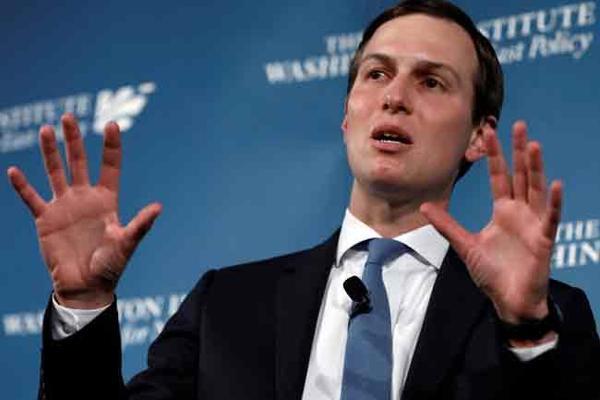Kushner: Mideast plan won't say 'two states'
WASHINGTON – Agence France-Presse


Jared Kushner revealed new contours on May 2 of the upcoming US peace plan for the Middle East, indicating that it will pull back from longstanding mentions of a two-state solution with the Palestinians and accept Jerusalem as Israel's capital.
Kushner, the son-in-law and senior adviser to President Donald Trump, is expected next month to present a long-awaited deal on behalf of the US administration, which has closely aligned itself with Israel's right wing.
Vowing to take a fresh approach, Kushner gave the administration's strongest indication yet that the plan will not propose two states for Israelis and Palestinians - for decades the US-backed goal in marathon peace talks.
"If you say 'two-state,' it means one thing to the Israelis, it means one thing to the Palestinians," Kushner said at the Washington Institute for Near East Policy.
"We said, you know, let's just not say it. Let's just say, let's work on the details of what this means," he said.
Kushner declined to give extensive details about the plan before its release but, asked if it would cover the final status between Israelis and Palestinians, he said: "That's correct, we will."
The Palestinian leadership has already said it does not accept mediation by Trump, whose evangelical Christian base is fervently pro-Israel and whose long list of actions in support of the Jewish state includes moving the US embassy to Jerusalem.
Israel considers the holy city its eternal capital, but Palestinians want east Jerusalem as part of a future state.
Kushner, who is also widely distrusted by the Palestinians for his family ties with Israeli Prime Minister Benjamin Netanyahu, said Trump asked him before his Jerusalem decision how it would affect peace prospects.
"The answer I gave him was I think short term it's probably harder, because people will be more reactive and emotional," Kushner said.
"But long term I think it helps because what we need to start doing is just recognizing truths, and I think that when we recognized Jerusalem, that is a truth - Jerusalem is the capital of Israel, and that would be part of any final agreement anyway," he said.
Netanyahu, campaigning in his successful re-election bid last month, vowed to annex parts of the West Bank, a step that would all but doom a Palestinian state.
Netanyahu's stance has alienated even longtime advocates for Israel within the US Democratic Party, who question whether the nation can remain both Jewish and democratic while millions of Palestinians live under occupation. But Kushner promised that Israel would make compromises, too. He said his team had spoken to Palestinian businesspeople and ordinary residents and believed the peace plan will be "very acceptable to them."
Kushner has reached out to oil-rich Gulf Arabs in an apparent bid to create economic incentives for occupied Palestinians.
"It's been very disheartening for us to see the Palestinian leadership has basically been attacking a plan (when) they don't know what it is," Kushner said.
"If they truly cared about making the lives of the Palestinian people better, I think they would have taken very different decisions over the past year - and maybe over the last 20 years," he said.
Kushner acknowledged that he may not be the one who finally makes peace in the Middle East, but said he at the very least wanted to "change the discussion."
"Our approach has been, if we're going to fail, we don't want to fail doing it the same way it's been done in the past," he said.
But Kushner, whose role in government alongside his wife Ivanka Trump has drawn heated criticism on ethical grounds, is at least assured of support in one key corner.
"When you work for a president, you try hard not to disappoint, but you can disappoint. When you work for your father-in-law, you can't disappoint."
